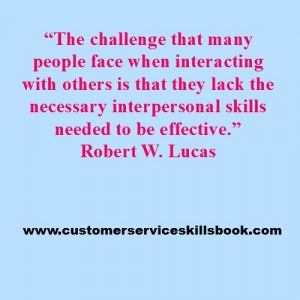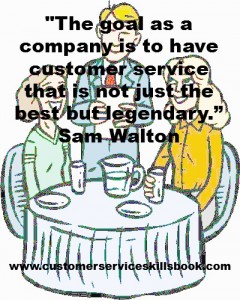The Importance of the Eyes in Non-Verbal Communication with Customers
The manner in which you communicate nonverbally with your customers is crucial in their perception of the quality of service that they received. It is also a major component of relationship-building and whether or not they are satisfied. Various research studies have shown that nonverbal components of the communication process (i.e. posture, gestures, vocal quality, and eye contact) often override the verbal messages that you send.
Eye contact, in particular, is important when interacting with others. An old adage explains why this might be true – “The eyes are the window to the soul.” In effect, people often interpret the emotional meaning behind your spoken words by looking into your eyes. That is why you must be conscious of your eye contact and the messages you are potentially sending with them. For example, if you have tentative eye contact (e.g. looking around and failing to look a customer in the eye without staring) while speaking to a customer, some people may interpret that to mean you are insincere or not committed to your message or that you are untrustworthy. Through your eyes, you can show that you are interested in a person and what they have to say. On the other hand, you can demonstrate that you are dissatisfied, frustrated, or even angry about something they said.
The bottom line is that the eyes can be a powerful tool in bonding with customers and can help send positive messages that might potentially help meet their needs, wants and expectations and lead to positive word-of-mouth advertising for you and your organization. To be more effective at what you do as a customer service representative, spend time honing your non-verbal customer service skills.
For more information on how the eyes and other nonverbal cues can help build stronger customer-provider relationships, get copies of Customer Service Skills for Success and Please Every Customer: Delivering Stellar Customer Service Across Cultures.
About Robert C. Lucas
Bob Lucas has been a trainer, presenter, customer service expert, and adult educator for over four decades. He has written hundreds of articles on training, writing, self-publishing, and workplace learning skills and issues. He is also an award-winning author who has written thirty-seven books on topics such as, writing, relationships, customer service, brain-based learning, and creative training strategies, interpersonal communication, diversity, and supervisory skills. Additionally, he has contributed articles, chapters, and activities to eighteen compilation books. Bob retired from the U.S. Marine Corps in 1991 after twenty-two years of active and reserve service.










